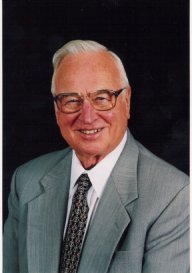My PBL Odyssey (Part 1): The Real World Ain't Like School: Revelations from a Private-Sector Experience in My Senior Year
By Joe Oakey
Reprinted from PBLNEWS,September 1997

My PBL Odyssey (Part 1): The Real World Ain't Like School: Revelations from a Private-Sector Experience in My Senior Year
|
 |
My father was an engineer/inventor who designed and manufactured machines and processes that automated manufacturing. Until the Depression, he conducted his business in a large converted barn behind our house. In this environment, I was capable of operating most machine tools while in junior high school. My father taught me mechanical drawing, and I became his draftsman when I was a sophomore. (My high-school advisors would not let me sign up for drafting courses because those courses were viewed as vocational and they felt I should take only college-prep courses.)
Near the end of my third year of high school, my father had a heart attack, and I became his surrogate on three jobs he had in process. One was to develop a double-throw nail machine for oversized nails, the second was a metal-extrusion process for forming mechanical pencil barrels, the third was a high-speed thread-rolling machine. Two of these were completely new concepts, and third was an extensive reworking of an existing process. All three contracts were with major manufacturers.
As his surrogate, my job was to drive my father to the plants and represent him in the factories. Every day, I would venture forth from the hotel where we were staying and go to the plants with his instructions. At the end of the day, I would return and report on our progress and on any problems we had encountered. He and I would then pore over the drawings and review the development of the project. The next day back I would go with our solutions and plans for the next steps.
At first, some of the engineers and machinists I worked with were leery of having a 15-year-old telling them what to do, even though they knew their instructions were coming from my father. At times, these were very discouraging environments to work in. But with a lot of support from my father and some of our clients, I found I could accomplish what had to be done, and I developed the confidence I needed to confront opposition if necessary.
By the end of the summer my father's health had not improved significantly, and the work was not completed. At a family meeting we decided that I would not return to school in the fall: my father and I had developed an excellent working relationship and the family felt it would take too long to train someone else to replace me. I was, of course, delighted because I didn't care that much for school in the first place and I had come to love what I was doing--it was meaningful, interesting, and challenging. School was not.
By Christmas, my father had recovered to the point where, with care, he could do the work himself. Another family meeting concluded that it was time for me to finish school. We looked around and found one that would give me full credit and allow me to graduate if I could catch up and pass all of my classes by the end of the year.
Meeting goals, solving problems, cutting through meaningless activities brought about in me new ways of looking at and doing school work. Not only did I complete school but I was also selected to represent the school and then the county in an annual state mathematics competition. I graduated with honors in both math and science.
What has this to do with my passion for Project-Based Learning? I consider the six months I spent working in the private sector as my father's representative the most valuable of my total educational experience. First, it had real meaning. Prior to that work, math was easy for me, but not interesting. When I learned, in machine design, some real-world applications of mathematics, the subject suddenly came to life for me.
Similarly, English no longer was just English, but a process of communicating ideas and concepts to others in a way that allowed them to understand without ambiguity. And engineering, I had learned, cannot be ambiguous. Listening and understanding others was critical, especially as a youngster dealing with experienced adults.
When I returned to school, it was easy to see what was meaningful and what was just busy work and to focus on the former. It is clear to me that students who have been involved in valid Project-Based Learning from a young age will learn valuable content much more readily and apply it much sooner.
I am also extremely supportive of meaningful apprenticeships for all high-school students, to allow them to learn how to apply the knowledge obtained in the classroom. It was an accidental part of my education, but what I gained from it has made me hope that we will eventually see it as a planned part of the intellectual development of all students.
For these and other reasons I have become an advocate of educational experiences that integrate the disciplines and provide students with the desire to learn because learning has meaning. To me, that means Project-Based Learning. The pioneering work started by the Autodesk Foundation, as well as others, has proven the value of this approach. And so I turn, once again, to my lifelong mission of working to create better learning experiences and environments, and to improve these practices.
About the Author:
Joe Oakey is President Emeritus of the Autodesk Foundation.